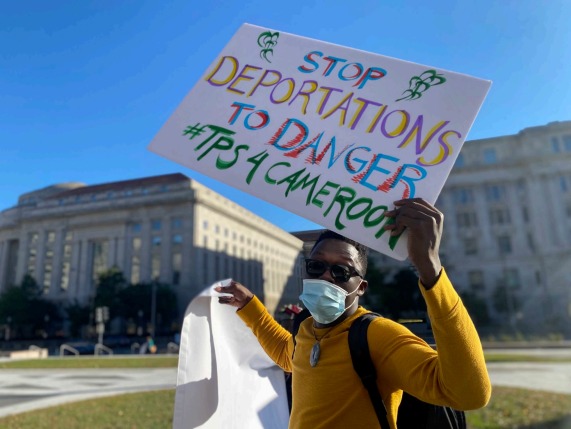Cameroonians in the US protest against deportation
By Hope Nda
The American Government has, for the first time, designated Cameroon for the much-advocated Temporary Protected Status, TPS, which grants Cameroonian asylum seekers and migrants, freedom to stay in US for the next 18 months.
The TPS, which began on April 14, 2022, is anchored on the ongoing armed conflicts in Cameroon and “extraordinary and temporary conditions” that prevent safe deportation, stated the US Department of Homeland Security, DHS, which made the announcement on April 15.
“The United States recognises the ongoing armed conflict in Cameroon, and we will provide temporary protection to those in need,” said DHS Secretary, Alejandro N. Mayorkas.
“Cameroonian nationals currently residing in the US, who cannot safely return due to the extreme violence perpetrated by Government forces and armed Separatists, and a rise in attacks led by Boko Haram, will be able to remain and work in the United States until conditions in their home country improve.”
The DHS, however, noted that the TPS designation is only for Cameroonians who have been residing in America until April 14 and it will not apply to people who are still to travel to the US. The status is open for renewal.
Several human rights organisations, including Human Rights Watch, Amnesty International and migrant advocacy groups in America have lauded the decision, which comes following years of advocacy.
“This news was long awaited and will provide temporary relief from deportation, as well as work permits to thousands of Cameroonians in the United States,” said Lauren Seibert, Human Rights Watch’s Researcher for Refugee and Migrant Rights.
The TPS will save thousands of Cameroonians who risked being deported back into the country. HRW says dozens of others deported between 2019 and 2021 have faced “serious human rights violations” upon their return, ranging from arbitrary arrests and detention, enforced disappearances, rape, torture, extortion and unfair prosecution.
In a joint release on April 15, five groups that have been advocating for an end to US Government deportations lauded the TPS designation, among them Cameroon Advocacy Network, Haitian Bridge Alliance, CASA, Robert F. Kennedy Human Rights, and Amnesty International.
These advocacy groups said they “are pleased at the Biden-Harris administrations’ decision to designate Cameroon for Temporary Protection Status, TPS.”
They added: “Due to longstanding socio-political tensions and armed conflicts in Cameroon, which have left thousands dead, 4.4 million people in need of humanitarian assistance and over 1 million people internally displaced, it is impossible for those currently in the United States to make a safe return to Cameroon”.
Federal Register Notice Needed To Effect TPS
The Temporary Protection Status for Cameroon will only go into effect after the publication of the Federal Register notice. Cameroonians cannot apply for TPS until the notice is released.
“The Federal Register notice will give instructions for applying for TPS and an Employment Authorisation Document (EAD),” stated the US DHS.
Rights groups have urged the Biden administration to fast-track the issuing of Federal Register notice and to open up the US-Mexico border for thousands of migrants being turned away over COVID-19 concerns.
“We urge the Administration to issue the Federal Register notice as soon as possible and to develop resources that recognise language access needs of the Cameroonian community,” stated a joint statement by the Cameroon Advocacy Network and four other human rights groups.
Human Rights Watch is also demanding that the US Government grants recently deported Cameroonians the opportunity to return to America.
Deepening Crisis Situation In Cameroon
Cameroon has been facing two armed conflicts – in the Far North, Northwest and Southwest Regions – that have triggered a humanitarian crisis and human rights violations.
In the Far North Region, the Government has been fighting Boko Haram insurgents since 2014, while a secession conflict in the Northwest and Southwest Regions has caused over 4,000 deaths since 2016, according to the United Nations.
Rights groups have estimated that 4.4 million people are in need of humanitarian aid while over 1 million others are internally displaced.
“The situation in the Northwest and Southwest Regions (NW/SW) remains tense with continued violence and targeted attacks. The civilian population, as well as health and education providers continue to face high risks when accessing facilities or when delivering health care and education services. They are continuously facing threats, direct attacks and armed incursions,” an OCHA report on March 9, 2022, said.
The report added that 3,223 out of 5,724 primary and secondary schools are non-functional because of the Anglophone Crisis and an estimated 462,000 students need emergency education assistance.
Separatists have continued attacks on the military, Government officials and civilians, human rights organisations have reported; while the military has equally been pushing hard on the Separatists, with accusations of also harassing the civilian population.
The Anglophone Crisis has caused the emigration of several English-speaking Cameroonians, some of who have sought asylum in America. But the successive Governments of Presidents Donald Trump and Joe Biden deported dozens of them back to the country, where Human Rights Watch reported that they were subjected to cruel human rights abuses.
In the report released on February 10, 2022, HRW said the US Government used a “discriminatory border expulsion policy” to bar Cameroonian asylum seekers from entering the country in 2020, using COVID-19 as pretext.
Not only that, the US also detained Cameroonians asylum seekers in immigration camps for months or even years before deporting about 190 of them since 2019, the HRW report said.
Back in Cameroon, deportees are said to have faced “serious human rights violations including rape, torture and other physical abuse, arbitrary arrest and detention, inhuman and degrading treatment in detention, extortion, and threats.”
